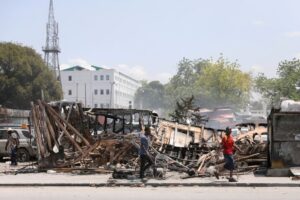By Rolando Astarita, a Marxist economist at the University of Buenos Aires in Argentina, published this article on his blog, reprinted in Correspondencia de Prensa. The ISP translated it to English.
In this note I present some reflections (which I do not pretend are exhaustive) on the Russian invasion of Ukraine that began on February 24.
First, let us note the reactionary and national-chauvinist character of the Russian intervention in Ukraine. A brutal expression of this is Putin’s denial of Ukraine’s right to independent existence. He even blamed that on Lenin, who recognized the Ukrainians’ right to self-determination.
In this regard, it is important to note that while Lenin did not encourage the separation of regions and peoples, he did assert that a centralized workers’ state should be sustained by the free adherence of all those who would be part of it. On December 6, 1921, he said: “The federation imposed from above will be nothing other than the creation of a supplementary bureaucratic apparatus, completely unpopular in the eyes of the masses, and separated from them.” The warning was about the complaints of the Caucasian republics (Georgia, Armenia, Azerbaijan) about the bureaucratic centralist methods that were used to pressure them. And in fact, in 1921 Georgia was “sovietized” by force, as Trotsky would admit many years later. That is why, and rightly so, dissident Georgian communists criticized the idea that a revolution could be based on the superstructure (the bureaucracy), without taking into account the state of society, its aspirations, its needs (see Carrere D’Encausse, 1987).
So historically, there were two orientations: Lenin’s (not always followed by the Bolshevik leader) that the recognition of national rights was the only way to effectively transcend national consciousness, and to move towards unity. And, on the other hand, the administrative bureaucratic approach, in which national minorities would be subsumed by repressive imposition, “from above”. Undoubtedly Putin, and the Russian leadership, continue this last line. Here only the decision of a leadership that places itself above what the working class and peasant and popular masses want, and stifles any possibility of popular democratic deliberation, is important. Therefore, with disdain for history, cultural realities, and the will of the Ukrainians, Moscow recognizes the independence of two small and fictitious “republics” in the Donbass (created in 2014 on the basis of the support of Russia itself) and rejects the right to existence of the Ukrainian nation. The result is the deepening of national divisions and rancor, and the exacerbation of conflicts within the working masses themselves. Russia’s criminal role in Syria, in support of the Al Assad regime, is being repeated today, and in an intensified form.
The entry of Russian troops into Ukraine divides the popular masses, enthroning the idea of the leader—or the executive power, it does not matter—who decides for the masses from above. That is why the defenders of regimes such as those in Venezuela, Nicaragua, Cuba and Syria, support Putin. It is the opposite of the idea, fundamental to Marx’s thought, that “the emancipation of the working class will be the act of the workers themselves”. It is also the opposite of internationalism and solidarity among peoples. For Marxists, the criterion should be that everything that leads to strengthening solidarity and collaboration among the working masses, whatever their nationality, is progressive. And everything that incites national, ethnic or any other kind of divisions is reactionary. But this is the effect of this invasion. With the addition of social decomposition—with millions of new emigrants looking for safety in Europe, at the mercy of governments and political regimes that are hostile to them.
Second, the “Great Russian” nationalist arrogance goes hand-in-hand with increasingly repressive and Bonapartist regimes. The persecution of dissidents, prohibiting free expression and the right to demonstrate, are the natural consequences of bureaucratic nationalism. It is not by chance that in Russia today it is considered “treason to the fatherland” to oppose the war. And the Russian repression in Ukraine is even worse.
Third, it is necessary to emphasize the criminal role of NATO, with the US at its head. They did everything possible to encircle Russia and fuel the conflict. NATO was originally formed as a mainly offensive alliance against the USSR and the Soviet bloc. With the fall of the Soviet system, it was supposed to disappear. But US policy was to extend it indefinitely. Thus, until the mid-2000s, Lithuania, Estonia, Latvia, Poland, Romania, Hungary, the Czech Republic, Bulgaria, Slovakia and Slovenia joined the Atlantic Alliance. In 2009, Albania and Croatia did so; in 2017 NATO recognized Bosnia-Herzegovina and Georgia as “aspiring” members. In 2019 it admitted, also as an aspirant, North Macedonia. Opposite this broad coalition, which surrounds Russia, is the Collective Security Treaty Organization (CSTO), consisting of Russia, Armenia, Belarus, Kazakhstan,Kyrgyzstan and Tajikistan. Georgia, Azerbaijan and Uzbekistan, which were part of the alliance, withdrew. The CSTO is incomparably smaller than NATO. For instance, the military expenditure of the Atlantic Alliance countries as a whole is about $1.174 trillion. Russian military expenditure (according to Russian government data) is one-eighteenths of that.
Therefore, Russia always considered NATO expansion as a challenge to its security. In this respect it is noteworthy that many U.S. journalists, analysts and politicians (including Kissinger) opposed the policy of encirclement and harassment of Russia. But the US and NATO continued to expand the Alliance.
Tension grew. In 2008, when the Ukrainian government sent an official letter to NATO requesting implementation of a Membership Plan (MAP), Putin warned that Ukraine’s joining NATO represented a threat to his country. Something similar happened with Georgia. Its government broke off relations with Russia after the latter’s military intervention in 2008 in support of the secession of the provinces of South Ossetia and Abkhazia. And it applied for NATO membership. Russia warned that its “red line” was the deployment of Western missile systems in Ukraine and Georgia. But the US responded by arguing the right of Ukraine and Georgia to decide. NATO, for its part, promised that both countries would be admitted at some point in the future. Another episode of high tension arose in June 2014, when a Putin envoy suggested, in an interview with the press, that if Finland joined NATO, it could start World War III. That same year Russia intervened in Crimea and incited the separatists of Donetsk and Lugansk to declare independence.
Against this background, everything indicated that at the NATO summit to be held in 2022, Georgia and Ukraine would be admitted. In December 2021, Russia demanded that NATO withdraw the promise of incorporating Ukraine and Georgia. NATO and the U.S. justified the stance on the “right of each country to decide”. It was a curious argument. In 1962, when the U.S. was on the verge of unleashing a nuclear war, it made clear that it would not permit installation of missiles in Cuba. What about the right to self-determination? Not to mention the number of US military interventions, or troops armed by the US, on multiple occasions and in countries around the world (including into Cuba). Plus, the promotion of coups d’état and support for bloody military dictatorships. This history and the expansion of NATO to the East show that the US and NATO have done everything possible to push tensions with Russia to the extreme.
Fourth, and linked to the above, it is not enough to say that NATO expanded eastward and encircled Russia. The fact is that this advance could not have occurred without the acceptance, to any appreciable degree, of the peoples of those countries. The governments that spearheaded and promoted these processes were not subject to major challenges, and in many cases the parliaments voted for the accessions. Even in countries that traditionally remained “neutral”, such as Sweden and Finland, opinions are divided (as they also seemed to be in Ukraine). Moreover, the arguments by those in favor of staying out of NATO include, first and foremost, not antagonizing Moscow. There is no evidence of a rejection of NATO as a military apparatus of imperialism and transnational capital in significant sectors of the populations of Central and Eastern Europe, or in the Baltic countries.
It is therefore necessary to look at this lack of reaction of the peoples against NATO head on and explain it. One possible answer is that we are facing a consequence of the long history of Russian military interventions, Soviet or non-Soviet, in those countries. For example, following Russia’s intervention in Georgia, in 2008 the government called for a referendum. The result was that 72 percent of voters favored joining NATO. It seems impossible to avoid the conclusion that they see NATO as protection against the Russian threat. This generates a spiral of actions and reactions that can only lead to an extreme increase in tensions.
In any case, the demand for withdrawal from NATO does not seem to have much chance of taking root among these peoples, at least for the time being. In addition, non-membership in NATO does not prevent collaboration and participation in international military operations with the Alliance. The case of Sweden, among others, demonstrates this.
Fifth, and on a more speculative level—today nobody knows how far Putin will go—we hypothesize that Ukraine may become a semi-colony of Russia. (See my analysis, using Lenin’s well-known categories here: https://rolandoastarita.blog/2016/07/07/por-que-segunda-independencia/. This is what would happen in the event of the imposition of a puppet government propped up by Russian troops and managed by Moscow. In that case Ukraine would have passed from a country dependent on the most globalized capitalism to a Russian semi-colony. In line with the Leninist approach, that eventuality would pose a struggle for the national liberation of Ukraine.
From the military and geopolitical point of view, Russia would annul any possibility of Ukraine’s accession to NATO. Economically, Ukraine would be pushed into a closer trade relationship with Russia. However, this will not prevent, in the medium term, the pressure of the world market on Ukraine. Russia’s power is limited. Despite having strong reserves and low debt, its gross domestic product (GDP), as has been pointed out these days, is roughly equal to Italy’s. Its per capital GDP per capita is much lower; and it is far from being at the forefront of technological change. In the long term, it has no way of counteracting the economic superiority of the U.S.and the European powers, nor that of China.
Sixth, the question arises as to whether the invasion of Ukraine is the prologue to a World War III. Following Lenin’s theses on imperialism, some Marxists consider that the world is on the way to armed confrontation between the powers. According to Lenin (also Bukharin) the outbreak of new wars between the powers for the division of the world was inevitable. Those Marxists who continue to adhere to that prognosis say that Russia’s entry into Ukraine foreshadows a third world war. Although they also announced something similar in 2003, when the US and Britain invaded Iraq. Or when Russia seized Crimea, in 2014. However, the announced world war did not happen. And everything would indicate that today, the conflict in Ukraine should not escalate to a global war between the powers. It is a reality that NATO countries refrained from sending troops to Ukraine. As Ukraine’s president has said, “they left us [to fight] alone”.
It is therefore necessary to explain why, almost eight decades after the end of the Second World War, there have been no further clashes on such a scale. I have discussed the issue in Value, World Economy and Globalization. The central idea—which I take from Ernest Mandel (1969) and Arrighi (1978)—is that the globalization of capital puts a ceiling on the development of conflicts. I quote a passage: “As Mandel had already pointed out, perhaps the most important transformation in the relations between powers was that in the post-war period the centralization of capital ceased to be ‘nationally centered’ and became international. It was this change that led Arrighi, in the late 1970s, to argue that the economic integration via direct investment that had developed in the postwar period under US hegemony provided a structural basis for the absence of inter-imperialist wars” (p. 341).
For example, the intertwining of capitals of various nations and the formation of the European Union make a war between countries of the old continent, devoted to the defense of “their” national capitals, very improbable. But the same is true of non-European powers. The holdings of assets (debt securities, share packages, real estate, etc.) of one country by residents of another country make these investors lose their exclusive identification with “their” national State. “This interpenetration of capital thus provides a basis for understanding why conflicts have an objective ceiling to their escalation…” (p. 343).
This is not to say that geopolitical conflicts between states—for zones of influence, for improving the competitive positions of their capitals, for market shares or access to sources of raw materials—disappear, but that they have a ceiling. To a certain extent they are localized and limited, although the possibility of one of these clashes leading to a generalized conflict always remains a possibility.
This situation of conflicts in the unity of the world capitalist system would help to explain why the confrontation with Russia seems to have limits. Already in 2014, when economic sanctions were applied to Moscow (for Crimea and its actions in Donbas), German and French investments in Russia continued. Thus, today France is the main foreign employer in Russia. Companies such as Total have strong investments in hydrocarbons. French banks such as Societe General are also active in the financial sector. Similarly, in 2014, German capitalism had investments in Russia of about €20 billion. In the following years, it did significantly reduce them. Germany and France were pressuring weaker countries (for example, Greece) to enforce sanctions, but they themselves continued their business. As has also been pointed out repeatedly these days, Germany now buys 40 percent of its oil and half of its natural gas from Russia. Of course, economic sanctions will strain and perhaps partially reverse this intertwining of capitalist interests. But it does not appear that, in the long term, it will reverse the trend towards the globalization of capital.
Finally, I point out a factor that is absent in many left-wing analyses. I refer to the fact that the working class does not have an organizing center, an International. It is an expression of the extreme weakness of internationalist and revolutionary currents today. There does not exist, at this juncture, any international organization of the working masses, which can coordinate and guide an internationalist response to the war, the advance of nationalism and militarism in the service of the multinationals or bureaucracies. In most countries the workers follow capitalist and nationalist leaders and parties, and in some cases,they support moderately reformist parties. But the only progressive response to this situation can only be given by a program and a strategy organized from an internationalist orientation. It is essential to bear this in mind.
References
Arrighi, G. (1978): La geometría del imperialismo, Mexico, Siglo XXI.
Carrere D’Encausse, H. (1987): Le Grand Défi. Bocheviks et Nations, 1917-1930, Flammarion.
Mandel. E. (1969): Tratado de economía marxista, Mexico, Era.
Rolando Astarita is an Argentine economics specialist, teacher and writer with a Marxist orientation.




